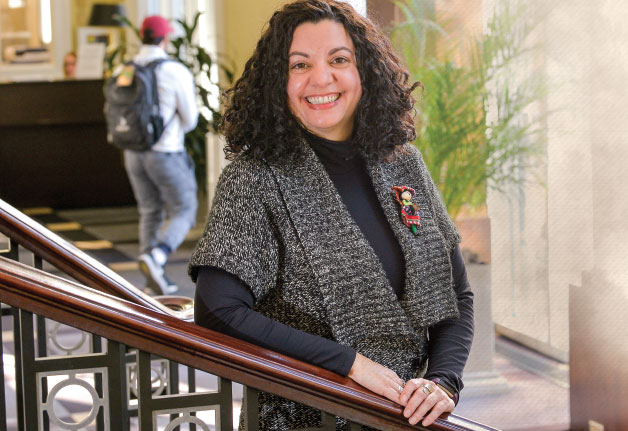On Jan. 5, 2018, Dr. Begoña Caballero-Garcia became the college’s first dean of diversity and inclusion. The title, however, just makes official the work she’s been doing at Wofford and in the Spartanburg community for almost 12 years.
“I love teaching, and I have a passion for social justice and for fighting prejudice and stereotypes,” she says. “If you have a job that you have a passion for, then you have an ideal job, and that’s the case for me.”
Since she joined the Wofford faculty, Caballero-Garcia, associate professor of Spanish, has woven diversity and inclusion into her curriculum, creating a new Spanish 201 course tied to a living-learning community for first-year students. Social Consciousness: Developing Skills for the 21st Century focuses on building Spanish-language competence within a culture of social consciousness, empathy, leadership, personal responsibility, respect, collaboration, inclusion, diversity and social justice. She encourages students in her Advanced Spanish Oral Proficiency course to pick controversial topics in Spain and Latin America to study. Her 400-level Spanish Theater course deals with plays that have characters who are marginalized because of race, age, sexual orientation, disability, gender or birthplace, and her Culture of Spain course includes a grant-funded component that incorporates Middle Eastern and North African Studies to break stereotypes about the Muslim world.
Caballero-Garcia has brought numerous speakers to campus to promote diversity and inclusion and has organized panel discussions on topics ranging from immigration and DACA to the lives of diverse artists. In addition, she advises the college’s RESULTS student organization that works to fight poverty in the United States, participates in Spartanburg’s Hispanic Alliance, has volunteered with the Spartanburg International Festival and YouthBASE in Greenville, and has served as a pro bono Spanish/English interpreter at local health fairs and schools.
“I am truly delighted that Dr. Caballero-Garcia will be stepping into this important role at Wofford,” says Dr. Mike Sosulski, provost. “The leadership she already has demonstrated in diversity and inclusion promises exciting things ahead.”
Caballero-Garcia was born in southwest Spain, not far from Portugal. She earned a bachelor’s degree in English from the University of Extremadura and then completed a master’s degree in Latin American and Spanish literature from Western Michigan University and a Ph.D. in Spanish literature from the University of North Carolina at Chapel Hill.
Her first memory of prejudice came during childhood.
“In my community there were gypsies. People would say that they were dirty,” she remembers. “My mother was a teacher. She would always explain to us that they are normal people, just like us, and we should not have prejudices or believe stereotypes.”
Now Caballero-Garcia shares that same lesson with her Wofford students. She telecollaborates with colleges and universities around the globe to introduce her Wofford students to peers in other countries. She also encourages international travel and study, especially when students have the opportunity to live with local families so they can have more authentic, meaningful experiences.
“It’s important that students are not just tourists,” she says. “We want them to have home stays, to belong to a family so they get to know the culture. It’s important that students get a good knowledge and are prepared to accept differences and fight their own stereotypes.”
Caballero-Garcia has led Wofford students on trips to Spain, Vietnam and Cambodia, Peru and Cuba. Her pre-departure experience in the classroom includes leadership training, cooperative games and strategies for promoting openness to new people and experiences.
Whether traveling with students, promoting diversity within the Spartanburg community or working toward a more inclusive campus, Caballero-Garcia says it’s about creating an environment where people feel that they belong and can express themselves.
“There’s more to each of us than our color, gender or ethnicity,” she says. “We’re not just Hispanic or white or black. Why not focus more on what we have in common? We are more alike than we often realize.”
In the coming year Caballero-Garcia will work closely with Demario Watts, assistant dean of students for diversity and leadership development; Arsenio Parks, admission counselor and director of diversity and inclusion for admission; the Presidential Committee on Diversity and Inclusion; and various student, faculty and alumni groups organized to foster a more diverse and inclusive community. She is charged with:
- Taking the 2017 Report of the Committee on Diversity and Inclusion as a starting point and collaborating with faculty and staff colleagues in crafting strategies to increase and support curricular and co-curricular diversity.
- Assisting the provost in implementing a sound strategy for the recruitment and retention of a diverse faculty.
- Supporting faculty development around inclusive pedagogies.
- Facilitating intergroup/interpersonal dialogue around difficulties among members of the community and collaborating with trained campus mediators when acute differences of understanding need to be addressed.
- Co-sponsoring educational experiences — curricular and co-curricular — that foster student learning across difference.
- Collaborating with staff who support international students and who advise students who study in international and domestic off-campus programs.
- Leading and coordinating diversity planning, including identifying and creating new initiatives that demonstrate the college’s commitment to a welcoming, inclusive environment for all of its students, faculty, staff and visitors.
- Overseeing a budget for activities that promote diversity and inclusion, such as diversity training, guest speakers and workshops on inclusive pedagogies.
By Jo Ann Mitchell Brasington ’89
